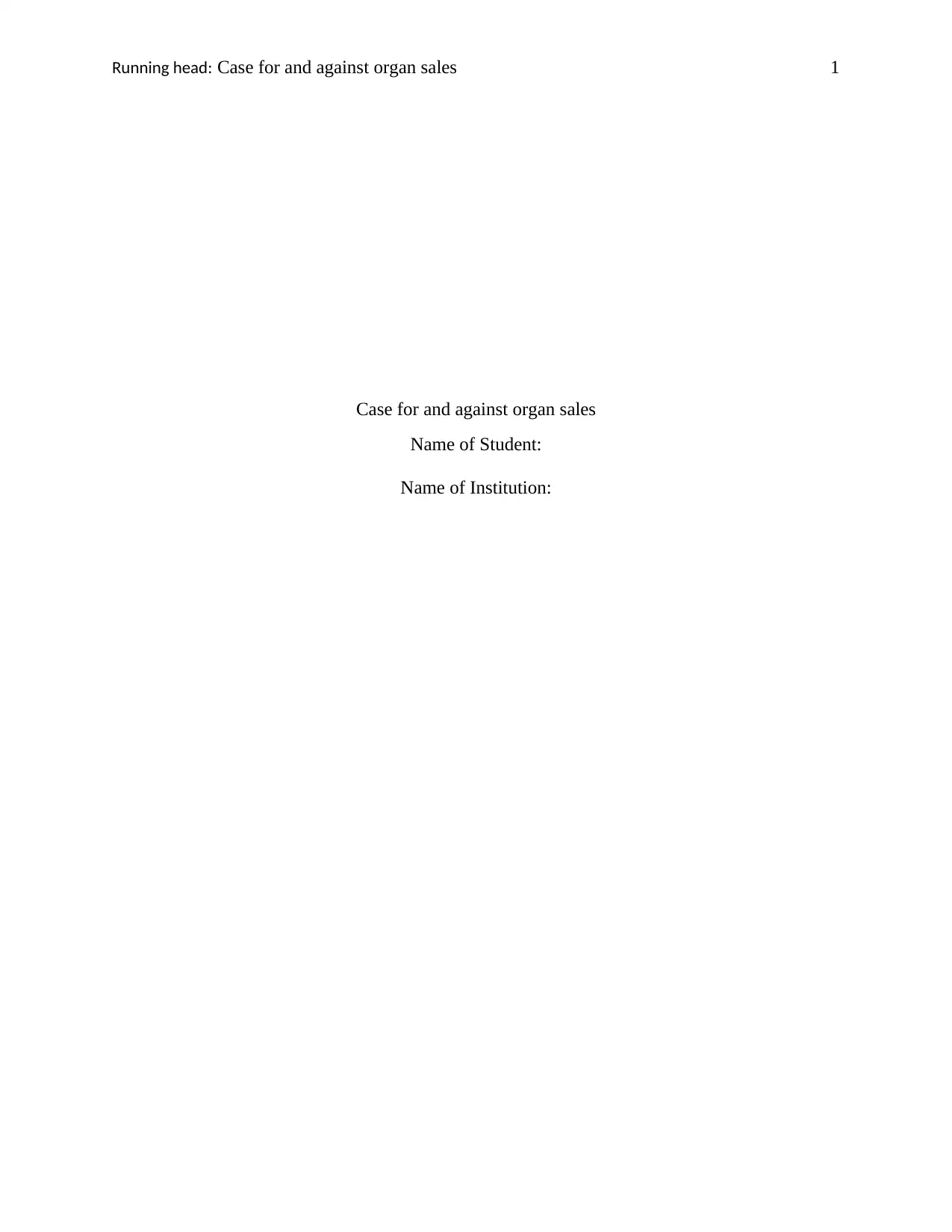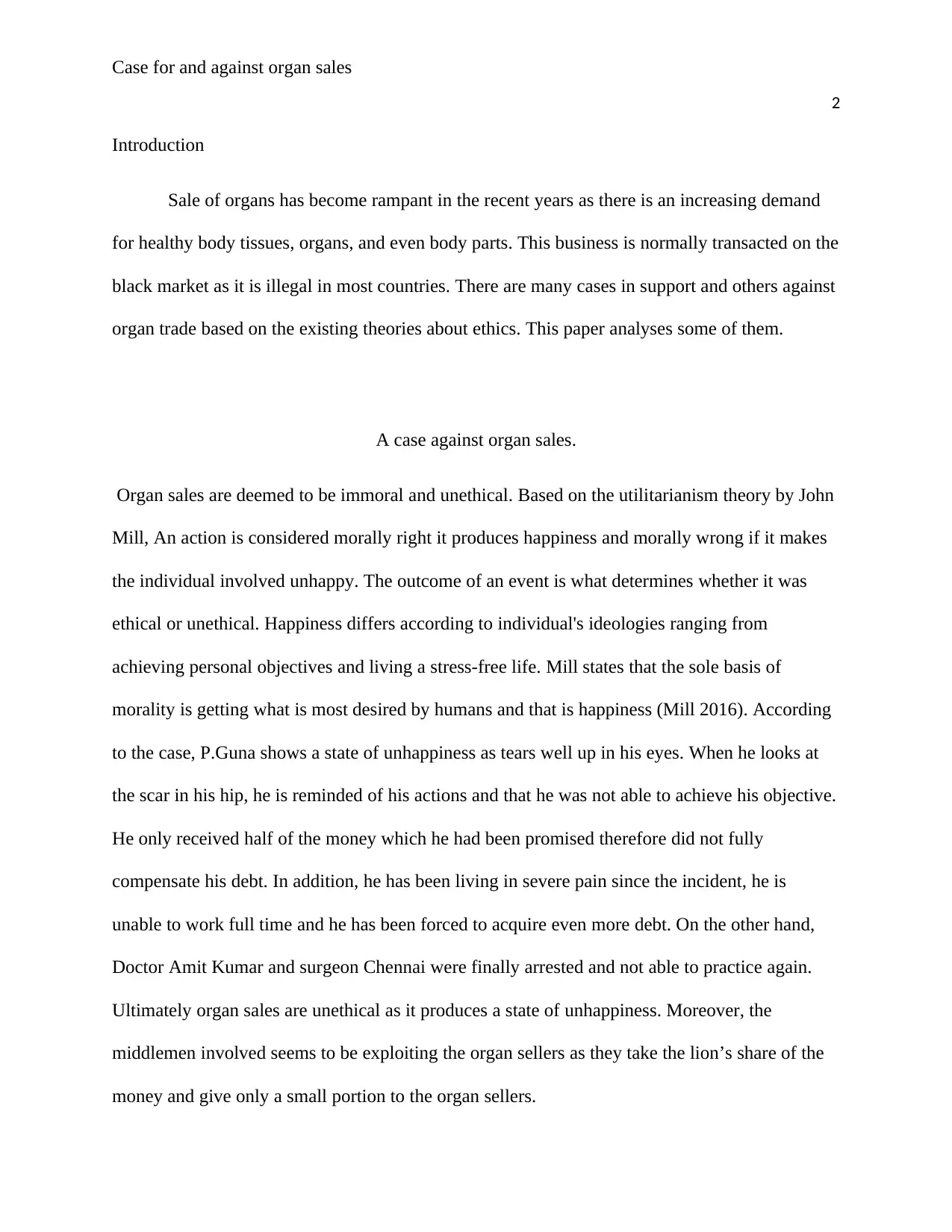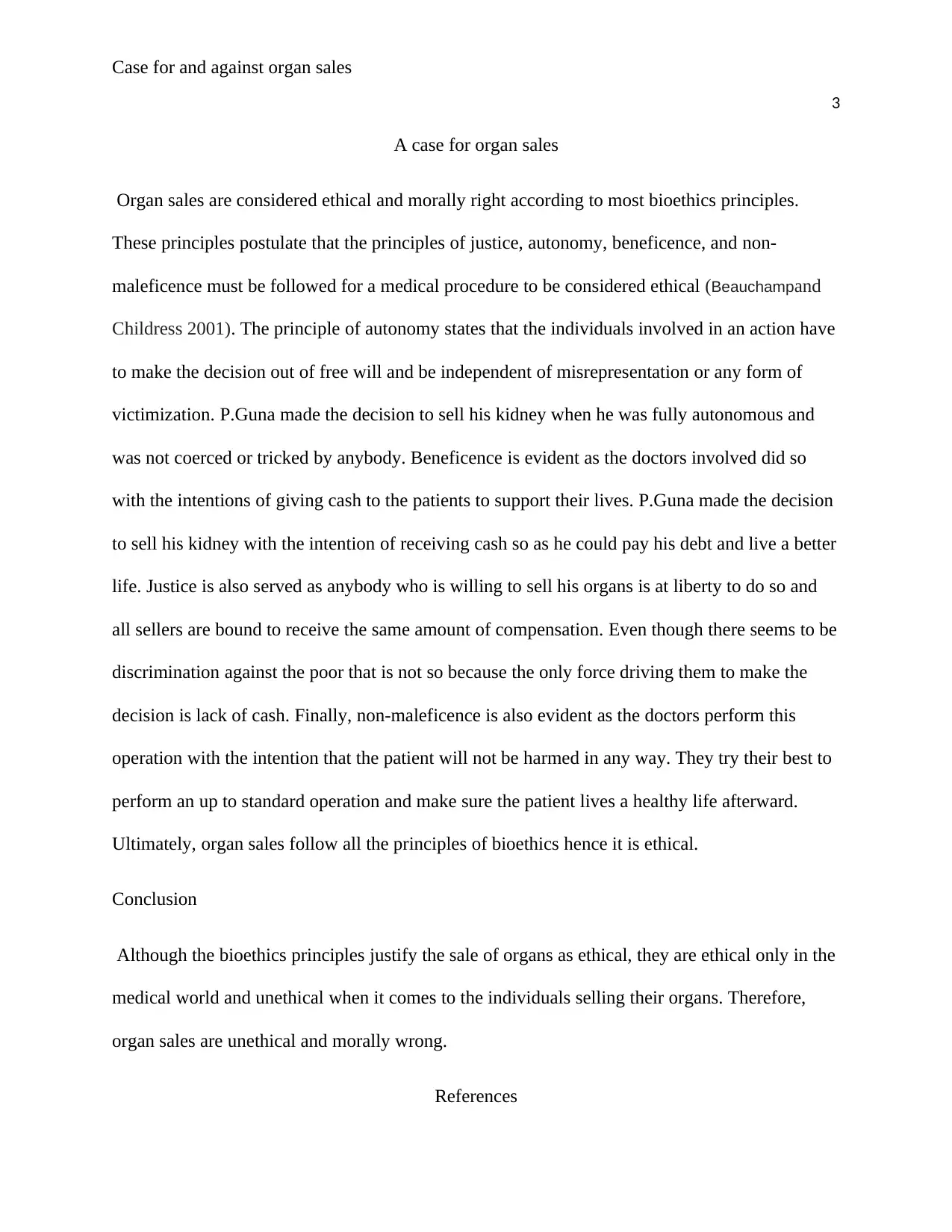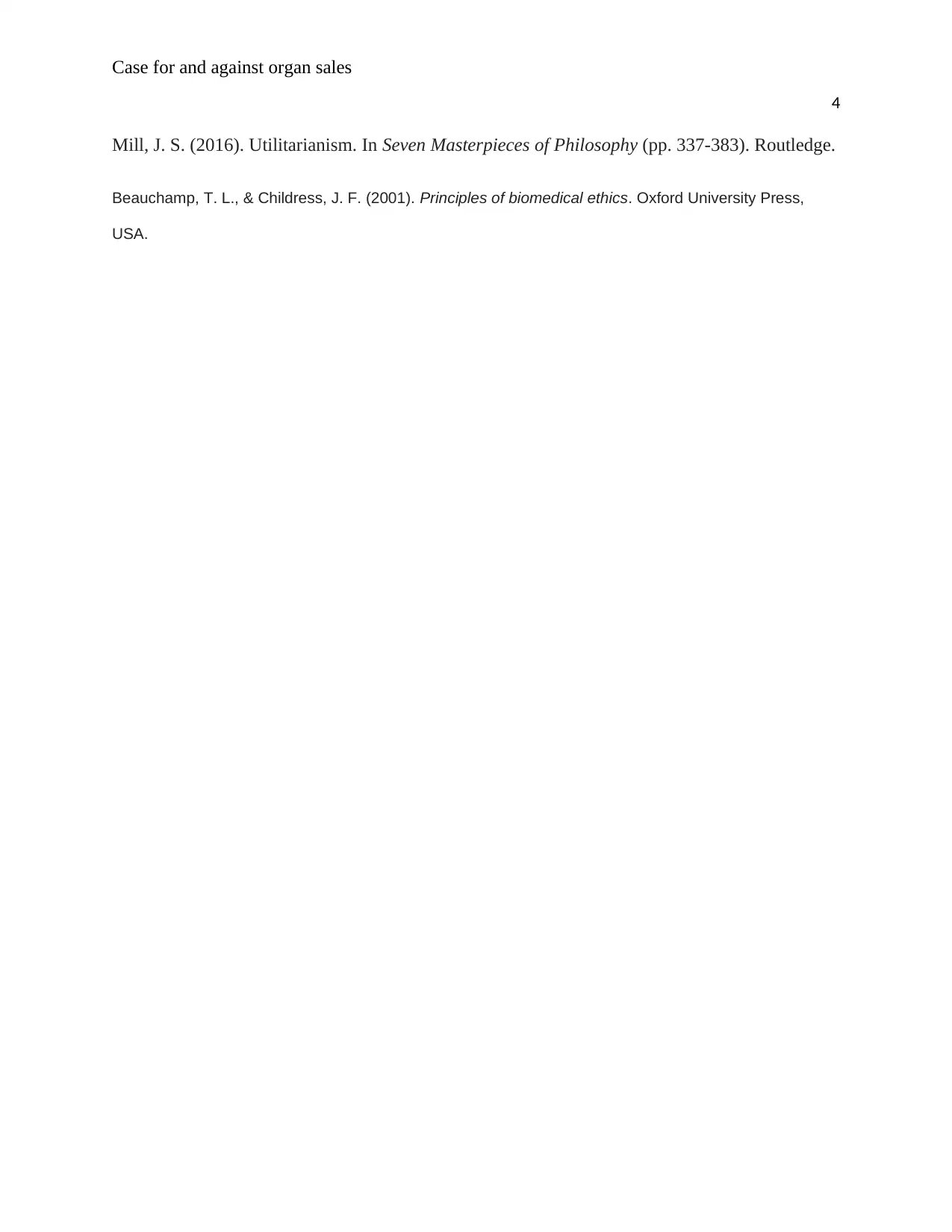The Morality of Organ Sales: A Case Study Analysis and Discussion
VerifiedAdded on 2023/06/10
|4
|757
|197
Essay
AI Summary
This essay explores the ethical dimensions of organ sales, presenting arguments both for and against the practice. It uses the utilitarianism theory by John Mill to argue against organ sales, highlighting the potential for unhappiness and exploitation. Conversely, it examines bioethical principles such as autonomy, beneficence, justice, and non-maleficence to build a case for ethical organ sales, particularly in scenarios where individuals make informed decisions. The essay concludes that while bioethical principles may justify organ sales in the medical context, the potential for exploitation and overall unhappiness makes the practice morally wrong.

Running head: Case for and against organ sales 1
Case for and against organ sales
Name of Student:
Name of Institution:
Case for and against organ sales
Name of Student:
Name of Institution:
Paraphrase This Document
Need a fresh take? Get an instant paraphrase of this document with our AI Paraphraser

Case for and against organ sales
2
Introduction
Sale of organs has become rampant in the recent years as there is an increasing demand
for healthy body tissues, organs, and even body parts. This business is normally transacted on the
black market as it is illegal in most countries. There are many cases in support and others against
organ trade based on the existing theories about ethics. This paper analyses some of them.
A case against organ sales.
Organ sales are deemed to be immoral and unethical. Based on the utilitarianism theory by John
Mill, An action is considered morally right it produces happiness and morally wrong if it makes
the individual involved unhappy. The outcome of an event is what determines whether it was
ethical or unethical. Happiness differs according to individual's ideologies ranging from
achieving personal objectives and living a stress-free life. Mill states that the sole basis of
morality is getting what is most desired by humans and that is happiness (Mill 2016). According
to the case, P.Guna shows a state of unhappiness as tears well up in his eyes. When he looks at
the scar in his hip, he is reminded of his actions and that he was not able to achieve his objective.
He only received half of the money which he had been promised therefore did not fully
compensate his debt. In addition, he has been living in severe pain since the incident, he is
unable to work full time and he has been forced to acquire even more debt. On the other hand,
Doctor Amit Kumar and surgeon Chennai were finally arrested and not able to practice again.
Ultimately organ sales are unethical as it produces a state of unhappiness. Moreover, the
middlemen involved seems to be exploiting the organ sellers as they take the lion’s share of the
money and give only a small portion to the organ sellers.
2
Introduction
Sale of organs has become rampant in the recent years as there is an increasing demand
for healthy body tissues, organs, and even body parts. This business is normally transacted on the
black market as it is illegal in most countries. There are many cases in support and others against
organ trade based on the existing theories about ethics. This paper analyses some of them.
A case against organ sales.
Organ sales are deemed to be immoral and unethical. Based on the utilitarianism theory by John
Mill, An action is considered morally right it produces happiness and morally wrong if it makes
the individual involved unhappy. The outcome of an event is what determines whether it was
ethical or unethical. Happiness differs according to individual's ideologies ranging from
achieving personal objectives and living a stress-free life. Mill states that the sole basis of
morality is getting what is most desired by humans and that is happiness (Mill 2016). According
to the case, P.Guna shows a state of unhappiness as tears well up in his eyes. When he looks at
the scar in his hip, he is reminded of his actions and that he was not able to achieve his objective.
He only received half of the money which he had been promised therefore did not fully
compensate his debt. In addition, he has been living in severe pain since the incident, he is
unable to work full time and he has been forced to acquire even more debt. On the other hand,
Doctor Amit Kumar and surgeon Chennai were finally arrested and not able to practice again.
Ultimately organ sales are unethical as it produces a state of unhappiness. Moreover, the
middlemen involved seems to be exploiting the organ sellers as they take the lion’s share of the
money and give only a small portion to the organ sellers.

Case for and against organ sales
3
A case for organ sales
Organ sales are considered ethical and morally right according to most bioethics principles.
These principles postulate that the principles of justice, autonomy, beneficence, and non-
maleficence must be followed for a medical procedure to be considered ethical (Beauchampand
Childress 2001). The principle of autonomy states that the individuals involved in an action have
to make the decision out of free will and be independent of misrepresentation or any form of
victimization. P.Guna made the decision to sell his kidney when he was fully autonomous and
was not coerced or tricked by anybody. Beneficence is evident as the doctors involved did so
with the intentions of giving cash to the patients to support their lives. P.Guna made the decision
to sell his kidney with the intention of receiving cash so as he could pay his debt and live a better
life. Justice is also served as anybody who is willing to sell his organs is at liberty to do so and
all sellers are bound to receive the same amount of compensation. Even though there seems to be
discrimination against the poor that is not so because the only force driving them to make the
decision is lack of cash. Finally, non-maleficence is also evident as the doctors perform this
operation with the intention that the patient will not be harmed in any way. They try their best to
perform an up to standard operation and make sure the patient lives a healthy life afterward.
Ultimately, organ sales follow all the principles of bioethics hence it is ethical.
Conclusion
Although the bioethics principles justify the sale of organs as ethical, they are ethical only in the
medical world and unethical when it comes to the individuals selling their organs. Therefore,
organ sales are unethical and morally wrong.
References
3
A case for organ sales
Organ sales are considered ethical and morally right according to most bioethics principles.
These principles postulate that the principles of justice, autonomy, beneficence, and non-
maleficence must be followed for a medical procedure to be considered ethical (Beauchampand
Childress 2001). The principle of autonomy states that the individuals involved in an action have
to make the decision out of free will and be independent of misrepresentation or any form of
victimization. P.Guna made the decision to sell his kidney when he was fully autonomous and
was not coerced or tricked by anybody. Beneficence is evident as the doctors involved did so
with the intentions of giving cash to the patients to support their lives. P.Guna made the decision
to sell his kidney with the intention of receiving cash so as he could pay his debt and live a better
life. Justice is also served as anybody who is willing to sell his organs is at liberty to do so and
all sellers are bound to receive the same amount of compensation. Even though there seems to be
discrimination against the poor that is not so because the only force driving them to make the
decision is lack of cash. Finally, non-maleficence is also evident as the doctors perform this
operation with the intention that the patient will not be harmed in any way. They try their best to
perform an up to standard operation and make sure the patient lives a healthy life afterward.
Ultimately, organ sales follow all the principles of bioethics hence it is ethical.
Conclusion
Although the bioethics principles justify the sale of organs as ethical, they are ethical only in the
medical world and unethical when it comes to the individuals selling their organs. Therefore,
organ sales are unethical and morally wrong.
References
⊘ This is a preview!⊘
Do you want full access?
Subscribe today to unlock all pages.

Trusted by 1+ million students worldwide

Case for and against organ sales
4
Mill, J. S. (2016). Utilitarianism. In Seven Masterpieces of Philosophy (pp. 337-383). Routledge.
Beauchamp, T. L., & Childress, J. F. (2001). Principles of biomedical ethics. Oxford University Press,
USA.
4
Mill, J. S. (2016). Utilitarianism. In Seven Masterpieces of Philosophy (pp. 337-383). Routledge.
Beauchamp, T. L., & Childress, J. F. (2001). Principles of biomedical ethics. Oxford University Press,
USA.
1 out of 4
Related Documents
Your All-in-One AI-Powered Toolkit for Academic Success.
+13062052269
info@desklib.com
Available 24*7 on WhatsApp / Email
![[object Object]](/_next/static/media/star-bottom.7253800d.svg)
Unlock your academic potential
Copyright © 2020–2026 A2Z Services. All Rights Reserved. Developed and managed by ZUCOL.





